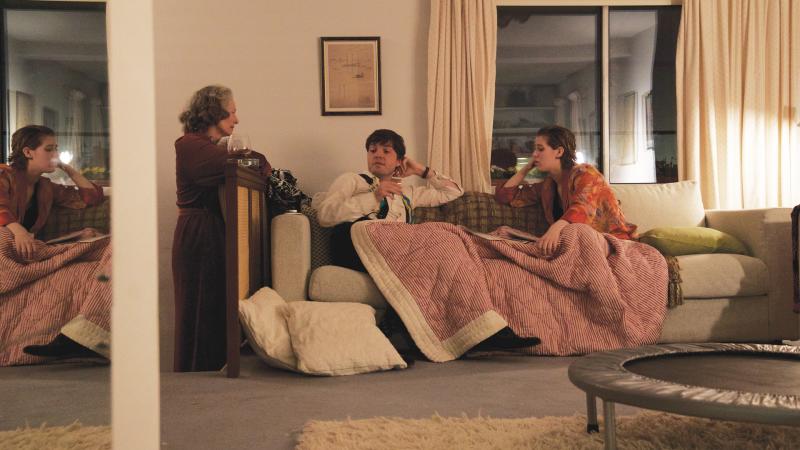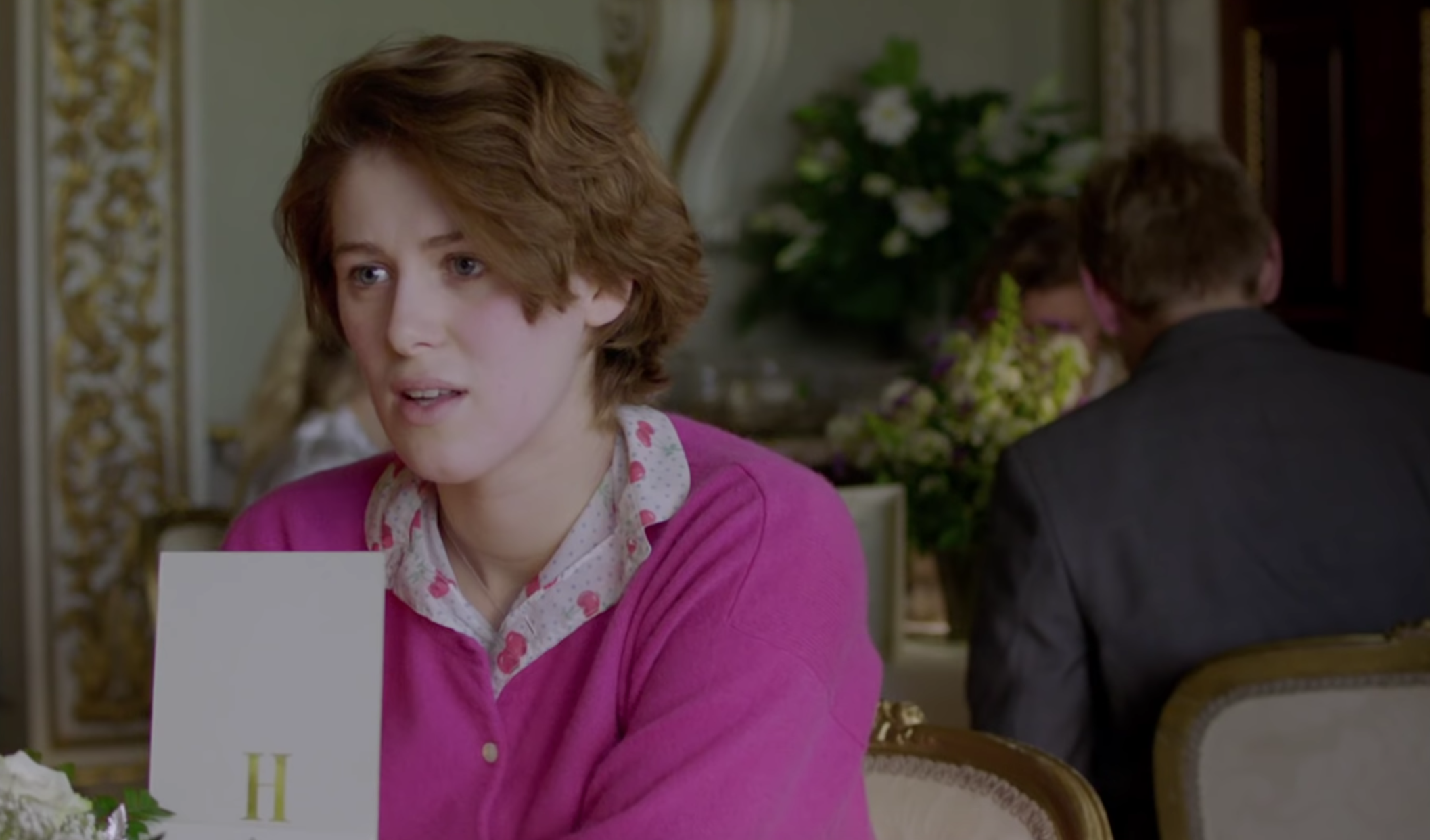The Souvenir review – Joanna Hogg's most emotionally wrenching film yet | reviews, news & interviews
The Souvenir review – Joanna Hogg's most emotionally wrenching film yet
The Souvenir review – Joanna Hogg's most emotionally wrenching film yet
Love is hell in Knightsbridge in romantic autobiographical drama

Joanna Hogg’s melancholy autobiographical drama The Souvenir cuts too close to the bone.
Like Conversations With Friends, too, The Souvenir, set in the first half of the 1980s, depicts a young woman’s affair with a withholding older man. Whereas Rooney’s protagonist Frances is a poor Dublin undergraduate enmeshed with a married middle-class actor, Hogg’s is an aspiring upper-class filmmaker, Julie (Honor Swinton Byrne), who lives rent-free in the Knightsbridge flat owned by her “county” mum (Tilda Swinton, Honor’s mother) and her gentleman farmer dad. That Julie hasn’t quite grown up is revealed by the way she turns to Swinton’s over-protective Rosalind for loans and lets her put her to bed with her childhood cuddly toys.
First glimpsed as a guest at one of Julie’s parties, the posh, worldly flaneur Anthony (Tom Burke) stealthily seduces her over a period of weeks. “You’re very special, Julie…you’re a freak,” this Hitchcockian man of mystery tells her, reassuringly adding that she will “always be lost”. Early in their courtship, he takes her to the Wallace Collection to see Fragonard’s eponymous 1778 painting, which was inspired by the heroine of Rousseau’s epistolary novel Julie, or The New Héloïse and shows a girl carving the initial of her lover’s name in a tree trunk. Similarly smitten, Swinton Byrne’s Julie chooses to disregard Anthony’s unexplained comings and goings. Soon after moving in with Julie, Anthony starts borrowing tenners from her and popping out to spend them. That he returns Julie’s love is indisputable, but nothing validates his claim that he works at the Foreign Office. She doesn’t quiz him about his alleged experience in Afghanistan in 1973 or his alleged involvement in the 1984 Libyan hostage crisis. They fail to discuss in depth the December 1983 car-bombing of Harrods, which she heard while working alone in the flat.
Soon after moving in with Julie, Anthony starts borrowing tenners from her and popping out to spend them. That he returns Julie’s love is indisputable, but nothing validates his claim that he works at the Foreign Office. She doesn’t quiz him about his alleged experience in Afghanistan in 1973 or his alleged involvement in the 1984 Libyan hostage crisis. They fail to discuss in depth the December 1983 car-bombing of Harrods, which she heard while working alone in the flat.
When a bohemian couple comes for dinner, the husband (Richard Ayoade) – a pretentious director suitably clad in a hideous animal-print jacket – casually discloses to Julie information about Anthony that comes as no surprise to the audience but knocks her for six. This occurs at the 45-minute mark. How Julie copes with this knowledge and Anthony’s subsequent behavior comprise the rest of the film; the upcoming sequel will presumably build on her tormented coming of age.
As The Souvenir traces Julie’s romantic disillusionment so it follows her artistic development at film school. She withstands a sneer from her male supervisor concerning her monied background. Anthony, a Powell and Pressburger fan, influences her decision to jettison her idealistic plan to make a social realist working-class family drama partially set in Sunderland’s ailing shipyards – Hogg makes ironic use of the Robert Wyatt version of Elvis Costello’s “Shipbuilding” (as she does elsewhere Joe Jackson’s “Is She Really Going Out With Him?”, Jona Lewie’s accidental Christmas hit “Stop the Cavalry”, Bartók’s opera Bluebeard’s Castle, and 1930s big band tunes). Though the distracted and sometimes ill Julie stumbles through her course, she gets on well with her fellow students, who come from all classes, and ends up working on a Derek Jarman-like film of Measure for Measure. It’s clearly more heartfelt than the Sunderland film would have been.
Correspondingly, The Souvenir – bolstered by Swinton Byrne’s moving debut (wholly devoid of mannerisms) and exquisite performances by Burke and Swinton – is the most emotionally wrenching of Hogg’s four features to date. The argument that she should be frowned on for using her impressionistically punctuated version of Loachian realism to explore upper- and upper-middle class lives is spurious. Her films (Archipelago particularly) are alert to bourgeois condescension and snottiness and reveal far more the unhappy truths of privileged existence than they do its felicities. Never a snob, Julie is as fragile as Anthony says she is, but she emerges from her ordeal apparently untarnished by cynicism. The sequel, currently in post-production, can’t come too soon.
The future of Arts Journalism
You can stop theartsdesk.com closing!
We urgently need financing to survive. Our fundraising drive has thus far raised £49,000 but we need to reach £100,000 or we will be forced to close. Please contribute here: https://gofund.me/c3f6033d
And if you can forward this information to anyone who might assist, we’d be grateful.

Subscribe to theartsdesk.com
Thank you for continuing to read our work on theartsdesk.com. For unlimited access to every article in its entirety, including our archive of more than 15,000 pieces, we're asking for £5 per month or £40 per year. We feel it's a very good deal, and hope you do too.
To take a subscription now simply click here.
And if you're looking for that extra gift for a friend or family member, why not treat them to a theartsdesk.com gift subscription?
more Film
 theartsdesk Q&A: director Kelly Reichardt on 'The Mastermind' and reliving the 1970s
The independent filmmaker discusses her intimate heist movie
theartsdesk Q&A: director Kelly Reichardt on 'The Mastermind' and reliving the 1970s
The independent filmmaker discusses her intimate heist movie
 Blu-ray: Wendy and Lucy
Down-and-out in rural Oregon: Kelly Reichardt's third feature packs a huge punch
Blu-ray: Wendy and Lucy
Down-and-out in rural Oregon: Kelly Reichardt's third feature packs a huge punch
 The Mastermind review - another slim but nourishing slice of Americana from Kelly Reichardt
Josh O'Connor is perfect casting as a cocky middle-class American adrift in the 1970s
The Mastermind review - another slim but nourishing slice of Americana from Kelly Reichardt
Josh O'Connor is perfect casting as a cocky middle-class American adrift in the 1970s
 Springsteen: Deliver Me From Nowhere review - the story of the Boss who isn't boss of his own head
A brooding trip on the Bruce Springsteen highway of hard knocks
Springsteen: Deliver Me From Nowhere review - the story of the Boss who isn't boss of his own head
A brooding trip on the Bruce Springsteen highway of hard knocks
 The Perfect Neighbor, Netflix review - Florida found-footage documentary is a harrowing watch
Sundance winner chronicles a death that should have been prevented
The Perfect Neighbor, Netflix review - Florida found-footage documentary is a harrowing watch
Sundance winner chronicles a death that should have been prevented
 Blu-ray: Le Quai des Brumes
Love twinkles in the gloom of Marcel Carné’s fogbound French poetic realist classic
Blu-ray: Le Quai des Brumes
Love twinkles in the gloom of Marcel Carné’s fogbound French poetic realist classic
 Frankenstein review - the Prometheus of the charnel house
Guillermo del Toro is fitfully inspired, but often lost in long-held ambitions
Frankenstein review - the Prometheus of the charnel house
Guillermo del Toro is fitfully inspired, but often lost in long-held ambitions
 London Film Festival 2025 - a Korean masterclass in black comedy and a Camus classic effectively realised
New films from Park Chan-wook, Gianfranco Rosi, François Ozon, Ildikó Enyedi and more
London Film Festival 2025 - a Korean masterclass in black comedy and a Camus classic effectively realised
New films from Park Chan-wook, Gianfranco Rosi, François Ozon, Ildikó Enyedi and more
 After the Hunt review - muddled #MeToo provocation
Julia Roberts excels despite misfiring drama
After the Hunt review - muddled #MeToo provocation
Julia Roberts excels despite misfiring drama
 London Film Festival 2025 - Bradley Cooper channels John Bishop, the Boss goes to Nebraska, and a French pandemic
... not to mention Kristen Stewart's directing debut and a punchy prison drama
London Film Festival 2025 - Bradley Cooper channels John Bishop, the Boss goes to Nebraska, and a French pandemic
... not to mention Kristen Stewart's directing debut and a punchy prison drama
 Ballad of a Small Player review - Colin Farrell's all in as a gambler down on his luck
Conclave director Edward Berger swaps the Vatican for Asia's sin city
Ballad of a Small Player review - Colin Farrell's all in as a gambler down on his luck
Conclave director Edward Berger swaps the Vatican for Asia's sin city
 London Film Festival 2025 - from paranoia in Brazil and Iran, to light relief in New York and Tuscany
'Jay Kelly' disappoints, 'It Was Just an Accident' doesn't
London Film Festival 2025 - from paranoia in Brazil and Iran, to light relief in New York and Tuscany
'Jay Kelly' disappoints, 'It Was Just an Accident' doesn't

Add comment